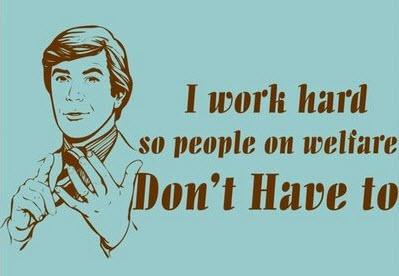Tax, rights, and ordinary people

Recently, in the middle of a conversation with some very articulate and well-educated people, the subject of social housing came up. One of the brightest delivered a short thesis on the proclivities of welfare recipients towards gambling, smoking, sitting at home all day watching Sky TV and letting their children run wild on the street. The rant began with the phrase "These people", which should have been warning enough. I've never actually heard a fair-minded comment starting with "These people". It's a close second behind "I'm not racist, but" on the list of terms that make the rest of the sentence redundant. He ended with an expression of aggrieved bewilderment at the excellence of the facilities in a particular social housing development, and at the fact that it was all being paid for by "ordinary people".
The speaker didn't seem to understand that the people living in the complex were also ordinary people. For him, ordinary meant working class or retired, middle-class or rich. People with money are ordinary. People who 'pay their way' are ordinary. 'Taxpayers' in other words, who because of their financial contribution to the state, have earned a right to anger and begrudgery at the welfare of others.
Now it's true, of course, that tax is the source of the government's revenue. So it's true for anything publicly funded, that "taxpayers are paying for all this". But there are caveats that should apply.
First, just to get it out of the way, we have to drop the idea that taxpayers are people with earned income. In Ireland, a taxpayer is anyone who's ever shopped, unless they subsist on vegetables and plain bread. VAT, excise duties, tolls and levies mean that just about everyone is paying tax, making a financial contribution to the provision of their own and others' welfare. So we are all taxpayers.
Secondly, anyone who begrudges the benefits afforded to people on welfare should at least be honest about it. It's a sham to loudly envy the lifestyle of some mythical class of idle poor when it is perfectly obvious that you would never choose that life for yourself or your children. Most people who gripe about the opportunities afforded to welfare recipients know they would never choose to give up their jobs and move to a halting site or to social housing. They know they're better off where they are.
Thirdly, becoming a taxpayer is really more privilege than burden. It's a choice you get to make if you're lucky. Earning enough to stay out of poverty gives us options about where to live, how to work, how to spend our free time. It lets us provide for our children, hope for our futures, enjoy our lives. Not everyone gets that choice. Not everyone is able to work, or can find work. Not everyone gets a decent education. Not everyone even feels able to join the world of college courses, car loans, mortgages. Most of us who got those chances jumped at them, or took them for granted from birth. Why should we be resentful now, if the less lucky ones also have a house and a television and enjoy the same TV programmes? Isn't it a good thing their children have a decent place to grow up, and will get the breaks that we got? Isn't that something worth providing for, if we can?
Finally, and most importantly, it doesn't matter that we work while others do not, or that we pay income tax while others spend it. That doesn't make any of us more ordinary or extraordinary. The Universal Declaration of Human Rights has been around now for more than 60 years, and it says we are all born free and equal, with rights to life and freedom, an education, a safe place to live. We have these rights, the UN General Assembly has agreed, because we are human, not because we are taxpayers. We all have these rights.
Some of us are luckier than others. Some of us pay more tax. Still, we live on the same island, pass each other on the same streets. We are all human, ordinary people. We should try to work together, and see what kind of society we can make here, for all of us. The alternative is no society at all. {jathumbnailoff}
